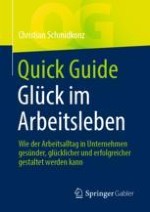2021 | OriginalPaper | Buchkapitel
2. Achtsamkeit, Mitgefühl und Dankbarkeit als Glücksfaktoren im Arbeitsalltag
verfasst von : Christian Schmidkonz
Erschienen in: Quick Guide Glück im Arbeitsleben
Verlag: Springer Berlin Heidelberg
Aktivieren Sie unsere intelligente Suche, um passende Fachinhalte oder Patente zu finden.
Wählen Sie Textabschnitte aus um mit Künstlicher Intelligenz passenden Patente zu finden. powered by
Markieren Sie Textabschnitte, um KI-gestützt weitere passende Inhalte zu finden. powered by
